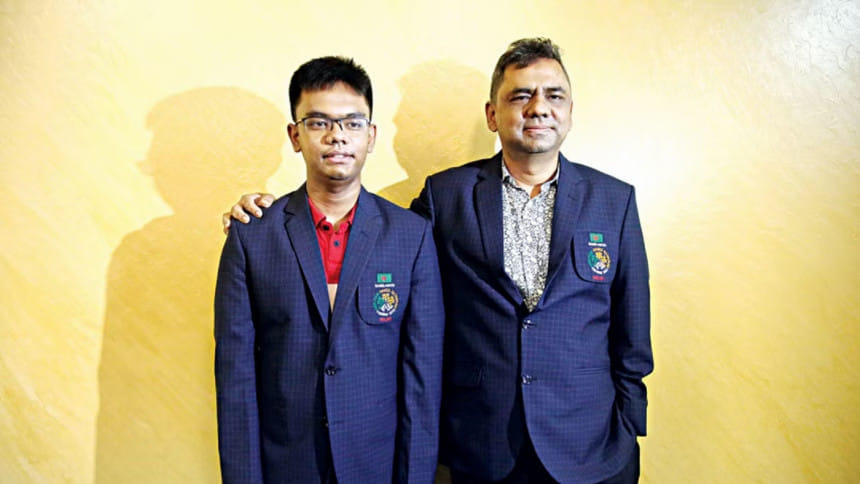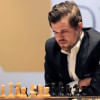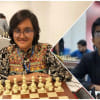A friend gone too soon

One
Chess is a part of my life. It is the love of my life as well. Though I am not skilled at it, I'm still a chess enthusiast. I enjoy good matches. Thanks to my personal relation with Grandmaster Ziaur Rahman, I have some knowledge of professional chess playing. I came to know about chess related terms like opening, middle game, end game, etc. from Zia. He told me about many ways of opening a chess game. I have borrowed many books on chess from him for reading.
With this write-up, I'd like to formally bid farewell to this renowned chess player of Bangladesh upon his sad, untimely demise.
He was a 14-time national champion. He performed brilliantly in many local and international tournaments. He led the Bangladesh's national team on several occasions.
After Niaz Morshed achieved the coveted GM title, Bangladesh has seen Zia, along with three other contemporary chess players achieving the same feat. The others are Reefat bin Sattar, Enamul Hossain Rajib and Abdullah Al Rakib. Despite having distinct personalities, they have one common trait: they all are self-centred individuals who don't open up to others too easily. However, we all shared a strong friendship. I'd even say that it was beyond a 'good' relationship, but rather something more.
I am not a chess player, but somehow, I have become an integral part of this bond of friendship. I consider myself lucky to be able to be friends with these highly skilled chess players of our nation. Usually, high-level chess players don't feel comfortable amid non-chess players. Other chess players from home and abroad become their friends. A chess player like Zia is almost always under a trance. But still, when he was an international master, we somehow became friends.
While on the path to earning the GM title, Zia earned the third norm after a lot of pain and sacrifice. An English chess magazine mentioned that Zia had lost the opportunity to attain this norm a total of 14 times. Such perseverance is not too common, even in the field of chess.
Upon hearing this, Zia mentioned that it was better to get it the tough way and that encouraged him to keep on working hard. He said that had he gotten the GM title too easily, he couldn't maintain good form.
After fulfilling the norm requirement, Zia returned to Dhaka. He was living in Shekhertek back then. His father, Paigam Uddin Ahmad, was an engineer by profession. He deserves credit for making Zia the person who he became -- he was the one who encouraged Zia to pursue chess during his childhood.
That day, I went to Zia's house early in the morning. Journalists were swarming around his residence. Zia was studying at Dhaka University at that time.
Zia was very happy. It took a massive amount of hard work for him to achieve the final norm. I remember, once during a chess tournament in Dhaka, Zia was paired up against a GM from Greece. If he won, he would fulfil the requirement of becoming a GM. Everyone was eagerly awaiting the triumphant moment.
However, Zia suffered a terrible loss. The final norm remained out of his reach. The federation's president himself came to console him, but he did not pay heed. After Zia came out of the hall room, we both got into a rickshaw.
During the ride, I saw tears in his eyes. He told me in a sad voice that he endured a lot of pain only to become a GM, and yet, he couldn't manage it.
While we sat at a quiet restaurant, he shared a lot of personal stories with me. He belonged to a middle class family -- and the family's only dream was to see him become a GM.
Then one day he actually managed to become a GM. The whole sports arena basked in his moment of glory. By then Zia had managed to clinch the title of 'sportsman of the year' several times. But nothing other than achievements from the field of chess impacted him.
For lunch, we had khichuri at Zia's residence. After that, we became comfortable and I sat for a game of chess against Zia, the newly crowned GM! His father stood beside us and kept on advising me on moves--one after another. At one point, his situation on the board become disadvantageous. He got a bit anguished, and mentioned, "This is not fair, dad!".
But his father was adamant like that. On the same afternoon, Zia was scheduled to compete against 100 chess players simultaneously. This interesting event was to take place in the Sultana Kamal sports complex as a celebration of his GM status attainment. The 100 chess players were seated in a circular manner—each of them having a chessboard in front of them. Zia took turns playing against each of them, and all the while, asked me to accompany him. This was a bit embarrassing for me, but Zia reassured me, these were not serious games. Within a short while, most of the players tasted defeat and promptly left the arena. Only two to four players could come up with some sort of resistance. But, still, within a very short time, Zia managed to defeat each of those 100 players.
After coming out of the complex, both of us had kabab and naan at a Dhanmondi restaurant. At that time, it was one of our most favourite meals.

Two
This probably happened in 1988. In a chess tournament, Zia would be facing the then Indian champion in the final match.
I was the feature editor of Dainik Bangla at that time. The match was supposed to take place in the national sports complex, which is five minutes' walk from my office. Before the match, Zia came to my office and we shared a meal of roti and fried vegetables. Even though the match was supposed to start at three, Zia was in a very relaxed mood. I urged him to make haste.
"Let's go, you have an important match today," I said.
Zia nonchalantly replied, "That is precisely why I am late. My opponent will be spooked at my absence. On the other hand, when we will start playing, I will confidently make my moves."
Zia reached the venue 30 minutes after the stipulated time. It was a breathtaking game of chess. The whole arena was filled with onlookers. Eventually, Zia won the game and clinched the trophy.
I saw Zia playing at the chess federation many times. I have also gone to Kolkata many times just to watch Zia and his other chess playing friends in action. Even recently Zia used to go there for coaching purposes. He'd stay there for long stretches.
Nowadays I used to watch Zia and his friends' games online. His playing style was eye-soothing. He used to take time in weakening the opponent's position. Zia always had a very good positional sense.
He used to study chess relentlessly. He liked keeping himself updated with the theoretical aspects of the game. He'd practice chess on the computer all the time. He would play online, too. All these activities kept him really busy.
Labonya is his wife's name. The couple's only child is Tahsin Tajwar Zia. At the tender age of 10, he became Bangladesh's seventh highest-ranked player. Thanks to his father's genes, Tahsin has managed to attract the attention at this very young age.
In recent times, Zia and Tahsin -- the father-son duo, used to practice together. They would go to the chess federation together. Sometimes, the father had to face the son in a match. But this never affected Zia. Zia gracefully accepted any result -- be it a win, draw or a loss, and vice versa. Tahsin is deemed a young chess player with a lot of future potential.
I can go on forever when it comes to reminiscing about the times I've spent with Zia. His wife respects and adores me. Both Zia and Labonya were fans of my cooking. On many occasions, I have cooked for them at my home as well as at their home. Zia was a connoisseur of good food. While hanging out with others, Zia would spend most of the time grinning. He seldom talked. He was also an occasional singer. I've listened to him singing during some of the major chess tournament's award giving ceremonies.
During his final years, Zia's dreams were circled around Tahsin. He gave his whole heart to bringing up Tahsin as a major chess player. Zia was Tahsin's main coach.
Modern chess is a complex mathematical affair. In order to perform well, players need to study a lot. They need to know the theories and the latest tactics. Chess is a game of position and combination. A person can become good at chess by acquiring and combining these two skills. Almost everyone knows how to play chess. But most of them only know how to move the pieces; only a few truly know the "game". Those who play at a high level are considered professionals. People who participate in several tournaments are semi-professionals and the others are amateurs. In order to get a grasp of chess, one needs to persevere a lot. I've been in touch with Zia and other chess players for over three decades. Still, I hardly know anything about chess. I couldn't truly fathom the true, often unworldly beauty of this game.
Although a sport, chess can very much be considered an art. Just like music and painting, it also a form of art and an amazing sport.
Grandmaster Zia made me realise all of this. Zia was an extraordinary human being with global fame.

Three
On July 5, I reached Kolkata airport. After passing through immigration, as soon as I got into the car, Imran Parosh (who was also there) received a call on his cellphone. Nafi Nazrul called from Dhaka. Nothing could prepare me for the news that came through. I could not believe Zia was no more. Chess was his life, and ironically, he fell on a chess table during his last moments. Everyone from the federation came forward after seeing Zia falling sick. He was quickly taken to the BIRDEM hospital. But by then, all signs of life had already left Zia. I realised I would never be able to see Zia again. I would never be able to treat him with my cooking again. Labonya's smiling face has now paled.
Zia! Wherever you are, stay well.
The writer is a children's author.
The artilce was translated from Bangla by Mohammed Ishtiaque Khan

 For all latest news, follow The Daily Star's Google News channel.
For all latest news, follow The Daily Star's Google News channel. 








Comments